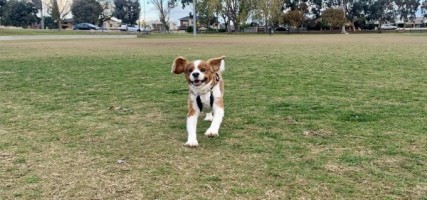Lenno’s diabetes
You may remember Lenno the Cavalier King Charles Spaniel cross from our previous newsletters. Over a weekend in August, Lenno suddenly started drinking copious amounts of water and urinating far more than what would be considered normal. He had also been very hungry over the past month (more than his usual self!) so a veterinary examination and some blood tests were in order.
A simple blood test was performed and it indicated that Lenno had high blood glucose (blood sugar levels). A urine test also confirmed the presence of glucose in his urine. A diagnosis of diabetes mellitus was made.
Diabetes is an endocrine disease where the body fails to produce enough insulin to help move sugar from the bloodstream into the cells for energy. For dogs, it is similar to type 1 diabetes in humans and patients generally require the administration of insulin once or twice daily.
The four main signs to watch out for:
- Increased appetite
- Weight loss
- Increased thirst
- Increased urination
Management of diabetes is life-long and involves regular blood tests, strict diet management and monitoring. Dogs usually require insulin treatment for life whereas cats may go into remission (the type of diabetes cats are prone to more closely resembles type 2 diabetes in humans). Some patients do not respond as we would expect so further investigation into other diseases may need to be considered.
We are happy to report that Lenno is responding well to treatment. He will require regular blood glucose curves in hospital over the next few months until he is stabilised on an ideal dose of insulin. He will also need to be monitored for potential complications such as the development of diabetic cataracts.
If you notice any changes to your pet’s daily habits such as a change in appetite or thirst, it’s a good idea to arrange a check up with us as soon as possible as there are many endocrine diseases that can present with similar signs. Early diagnosis and treatment can help prevent secondary complications that can in some cases be life threatening.
If you are worried about your pet you should always call us for advice.

